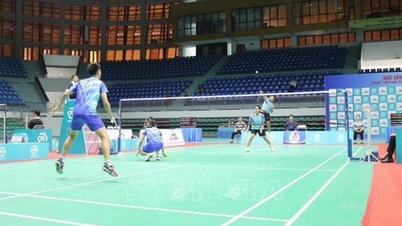
Prolonged COVID-19 infection may promote the emergence of new variants - Photo: EPA
According to medical experts at Boston University (USA), the patient is a 41-year-old man who has had a cough, headache, and fatigue since mid-May 2020, shortly after coming into close contact with a COVID-19 case.
It was not until September 2020 that the man was diagnosed with COVID-19 after his health worsened and he was forced to be hospitalized.
According to IFLScience on September 15, the patient was also diagnosed with HIV in 2002 but did not comply with antiretroviral therapy (ART) (standard treatment to suppress HIV and maintain immune function) as prescribed. As a result, his immune system was severely weakened and could not destroy the SARS-CoV-2 virus that causes COVID-19.
Over the months, the virus in his body developed many mutations, including some later found in important variants like Omicron.
Although the virus had created a unique strain in the patient's body, it did not appear to spread outside, possibly because it had adapted so well to his immune environment.
It is noteworthy that two days before his death, the PCR test still showed positive results for the SARS-CoV-2 virus.
Most healthy people who get COVID-19 will recover in a few days to a few weeks. However, there are "exceptions", like the man mentioned above.
Before him, in April 2024, doctors in the Netherlands reported the case of a 72-year-old man with a weak immune system who had COVID-19 for 613 days.
Earlier in 2022, another patient with a weakened immune system at a hospital in the UK tested positive for SARS-CoV-2 505 days before his death.
The above special cases show that the virus will be extremely dangerous for people with weak immune systems.
This also highlights the importance of continuing to monitor COVID-19 globally, the team said, as prolonged illness could fuel the emergence of new variants, even after the pandemic has ended.
The study was published in the journal The Lancet: Microbe .
Source: https://tuoitre.vn/phat-hien-nguoi-mac-covid-19-lau-nhat-keo-dai-toi-776-ngay-2025091612141804.htm




![[Photo] President Luong Cuong receives US Secretary of War Pete Hegseth](https://vphoto.vietnam.vn/thumb/1200x675/vietnam/resource/IMAGE/2025/11/02/1762089839868_ndo_br_1-jpg.webp)


![[Photo] Lam Dong: Images of damage after a suspected lake burst in Tuy Phong](https://vphoto.vietnam.vn/thumb/1200x675/vietnam/resource/IMAGE/2025/11/02/1762078736805_8e7f5424f473782d2162-5118-jpg.webp)
































































































Comment (0)